BPYO TOUR TO SOUTH AFRICA: ACT 5 - PILANESBERG & FINALE ULTIMO

What is a trip to South Africa without a safari? A waste of money, according to Tshidi Mogorosi, one of our tour managers: the natural wonders of the country, she told me, are among the things in which she and her fellow citizens take their greatest pride. Happily, Benjamin Zander and the powers behind the BPYO’s South African tour agree, so we found ourselves, for the last three days of our trip, in a game lodge on the edge of Pilanesberg National Park.

Hippos lying in wait.
It’s a bit of an atypical – though by no means unwelcome – finish to our eighteen-day tour: most of these excursions wrap up after the final concert and, come the next morning, we all head to the airport and then go our separate ways. Given what the orchestra’s been through this year and on this trek, though, three or four days of R&R before embarking on the long-haul return to the U.S. is a gift.
True, there’s not a purely musical purpose to it. But that’s fine. I’ve been thinking lately of Arthur Rubinstein’s admonition to Michael Tilson Thomas when the latter was in the early stages of his career. Speaking of developing an understanding of Romantic music, particularly, the venerable pianist encouraged his younger colleague to live like Schumann did and not to “forget to save plenty of time to travel, see great art in museums, eat, drink great wine, eat wonderful food, meet fascinating people.”
While that’s good general life advice (and we’ve managed to indulge in some, if not quite all, of Rubinstein’s recommendations while we’ve been here), it applies particularly well to musicians who spend their days playing, say, Beethoven, Mahler, and Strauss. Music and music making don’t exist in some sort of vacuum and to be reminded of this reality – especially when so much of our repertoire consists of fare from the increasingly distant past – is invaluable.
It’s also a worthwhile effort to draw ties between various places and specific works. Take it from me: the “Sonnenaufengang” from Strauss’s Alpensinfonie applies just as well to an African sunrise as it does an Alpine one.
Besides, after music, it seems that the next best way to bring people together is to spend time observing animals living (more or less) in the wild. To hear an orchestra of 112 fawning over penguins in Cape Town’s Boulder Bay a few days ago was as enchanting as it was amusing: the inflections of everyone’s oohs and aahs were astonishingly well-matched.
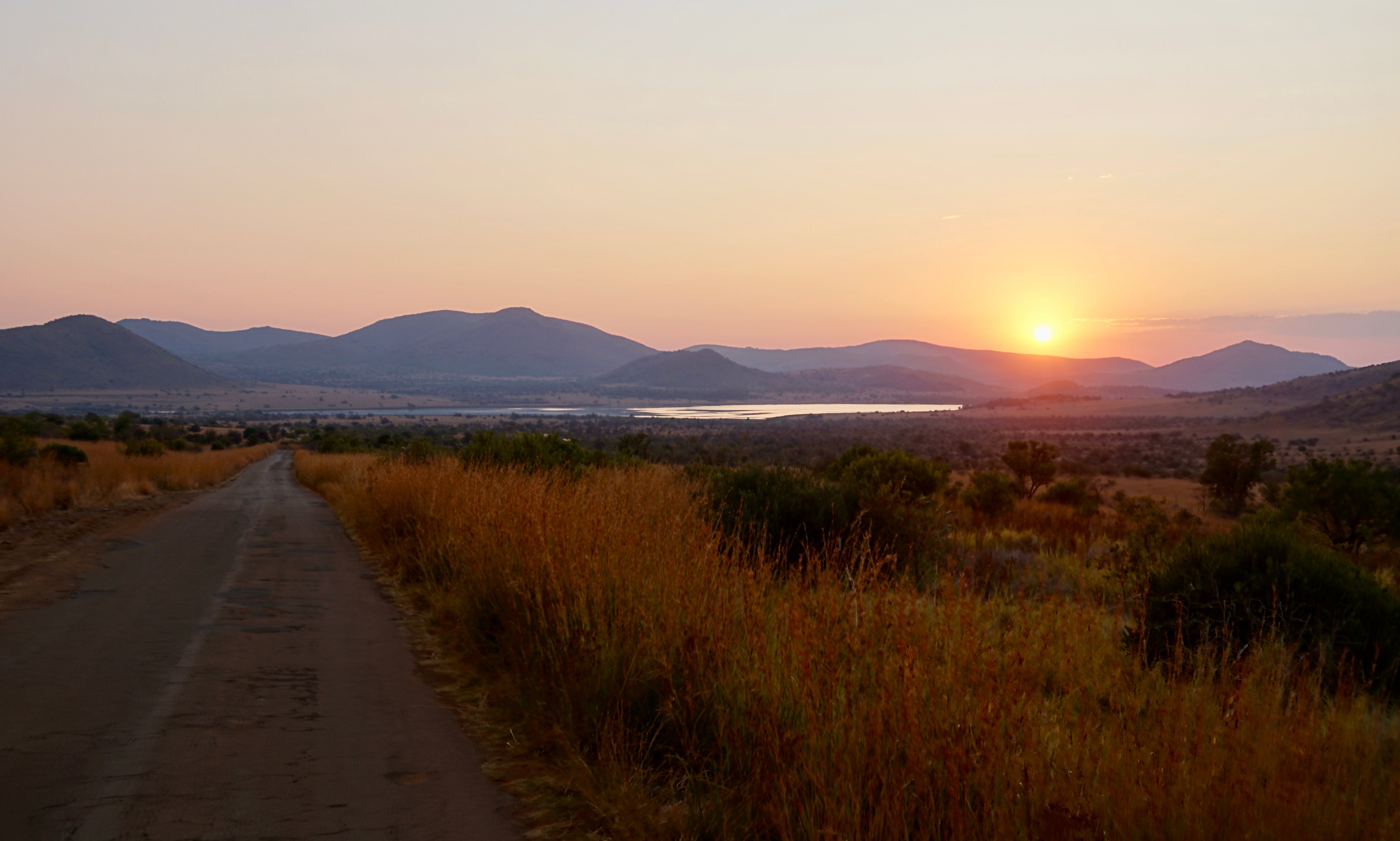
Sunrise is Pilanesberg National Park.
There was more of that – as well as louder, more excited reactions – to the various sightings of giraffes, elephants, rhinos, kudus, impalas, hippos, lions, cheetahs, and more in Pilanesberg over the last few days.
The visuals of the place, which was formed some millions of years ago by a series of volcanic eruptions that scattered rock and ash into an array of craggy hills and peaks roughly twice the area of Boston, are striking. To combine everything together, especially as the sun shifts so quickly during the short winter days here, is, for want of a better word, spectacular.
So it was during our visit, which, for the most zealous among us, offered the opportunity of up to four game drives, copious amounts of food, recreational areas (including a trampoline), and Edenic accommodations. There was also plenty of time to relax and mingle with one another, a phenomenon that doesn’t occur nearly as much as one might expect on these undertakings.
Anomalous as ending an orchestra tour with a safari is, on Tuesday night we stuck to the usual closing ritual of these sojourns: a celebratory final meal followed by an “appreciation meeting.” The former came in the form of our first and only traditional South African braai (basically a barbecue involving all sorts of meats and an array of vegetables cooked in cast-iron pots over an open flame), eaten al fresco. Afterwards, back at the lodge, was a time of sharing reminiscences of the last two weeks and thanking all those involved in the tour.
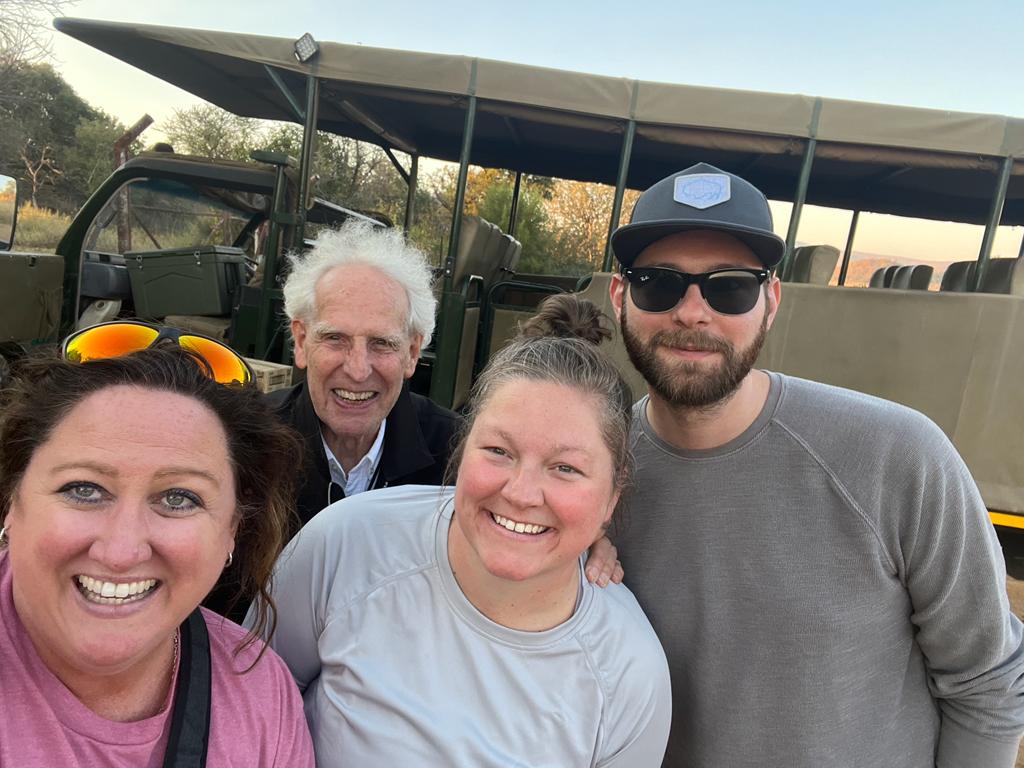
BPYO conductor Benjamin Zander with chaperones Kysha Bradshaw (l), Rosie Conway (c), and Josh Newburger (r).
It was a big, but truly exceptional, group: chaperones Derek Beckvold, Kysha Bradshaw, Peter Chew, Rosie Conway, Lise Leishman, Josh Newburger, Deb Ramsay, and Sarita Uranovsky; physician Brad Sampson; production managers Derek Wohl and Marie Svoboda; photographer Paul Mardy; and videographer Dave Jamrog. Ours was a team with extraordinary rapport.
We were also deeply appreciative for the work of our three tour guides: Tshidi, Patrick Swanson, and Johnathan Muller. To say that the trio ingratiated themselves with us is an understatement. By the time they dropped us off at O. R. Tambo International Airport on Wednesday night, many of our number felt that these folks were parts of our extended families, so kind, generous, caring, and informative had they proved throughout our extended time together.
Equally important was the behind-the-scenes crew, consisting of BPYO senior advisor Mark Churchill; assistant conductor Alfonso Piacentini; and Ben’s assistant, Bob Jordan. Supervising it all were Meisterdirigentin (and BPYO managing director) Elisabeth Christensen, whose mastery of literally all the details is as astounding as ever, and Johan van Zyl, our outstanding tour director from Classical Movements.
The head of the enterprise is, of course, Benjamin Zander, and this tour was an undertaking that simply couldn’t have happened without him. Indeed, it’s hard to imagine someone else with the ability to both envision a trek like this and the wherewithal to pull it off, financially and musically.
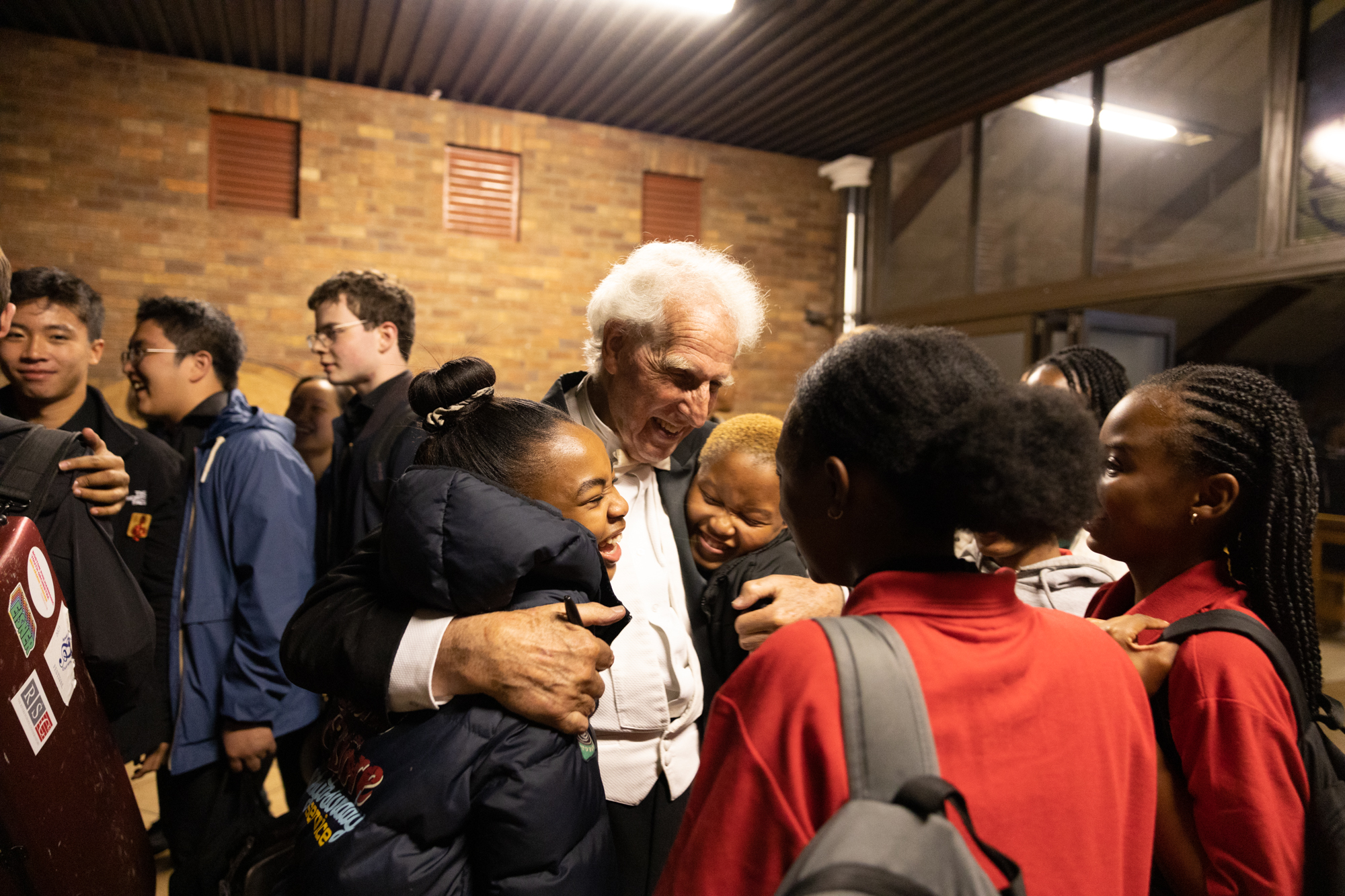
Benjamin Zander with audience members after the orchestra’s concert at Regina Mundi Roman Catholic Church.
Yet nearly everything about this epic journey to South Africa played to Ben’s formidable strengths as a conductor, inspirational teacher, leader, and fundraiser. He prepared the orchestra, enrolled financial backers, led the concerts, coached the local musicians we met, and provided our travels their overarching philosophical framework. True, Ben does this every tour. But the demands of this one were especially immense and he embraced them all with alacrity.
Of course, this was a particularly special tour for him: as Ben liked to tell our audiences, it was the belated fulfillment of a promise he’d made to Nelson Mandela in 1996 that someday he’d bring his youth orchestra to the country. Fittingly, then, we didn’t just get to visit South Africa; rather, we were given an overview of the place that was, if not comprehensive, then multifaceted and highlighted its mind-bending complexities and furious contrasts.
We got to experience, for instance, the vexing reality of South Africa’s dysfunctional electrical grid from early on: the practice of “load shedding” (basically rolling, hours-long blackouts that hit at unpredictable times – like during our concert in Soweto) was evident in every city we visited.
The stark divergences between wealth and poverty here was impossible to miss, even in rural spots: walled compounds and shacks built out of cinderblocks with tin roofs sit across the street from one another and sometimes side-by-side.
We heard, too, of the legacy of apartheid. All three of our tour managers, in fact, grew up under that system; it’s very much living memory, as we were reminded during a sobering visit to the Apartheid Museum in Johannesburg on Wednesday afternoon before our departure.
At the same time, we also experienced the enthusiasm, warmth, kindness, generosity of spirit, friendliness, and amiability of the South African people everywhere we went. Some had much, others not. It didn’t matter: “You don’t need to be rich to be happy,” a grateful listener told Ben late in the trip. That was a remarkable attitude to experience and a profound takeaway from the trip, especially given all we saw.
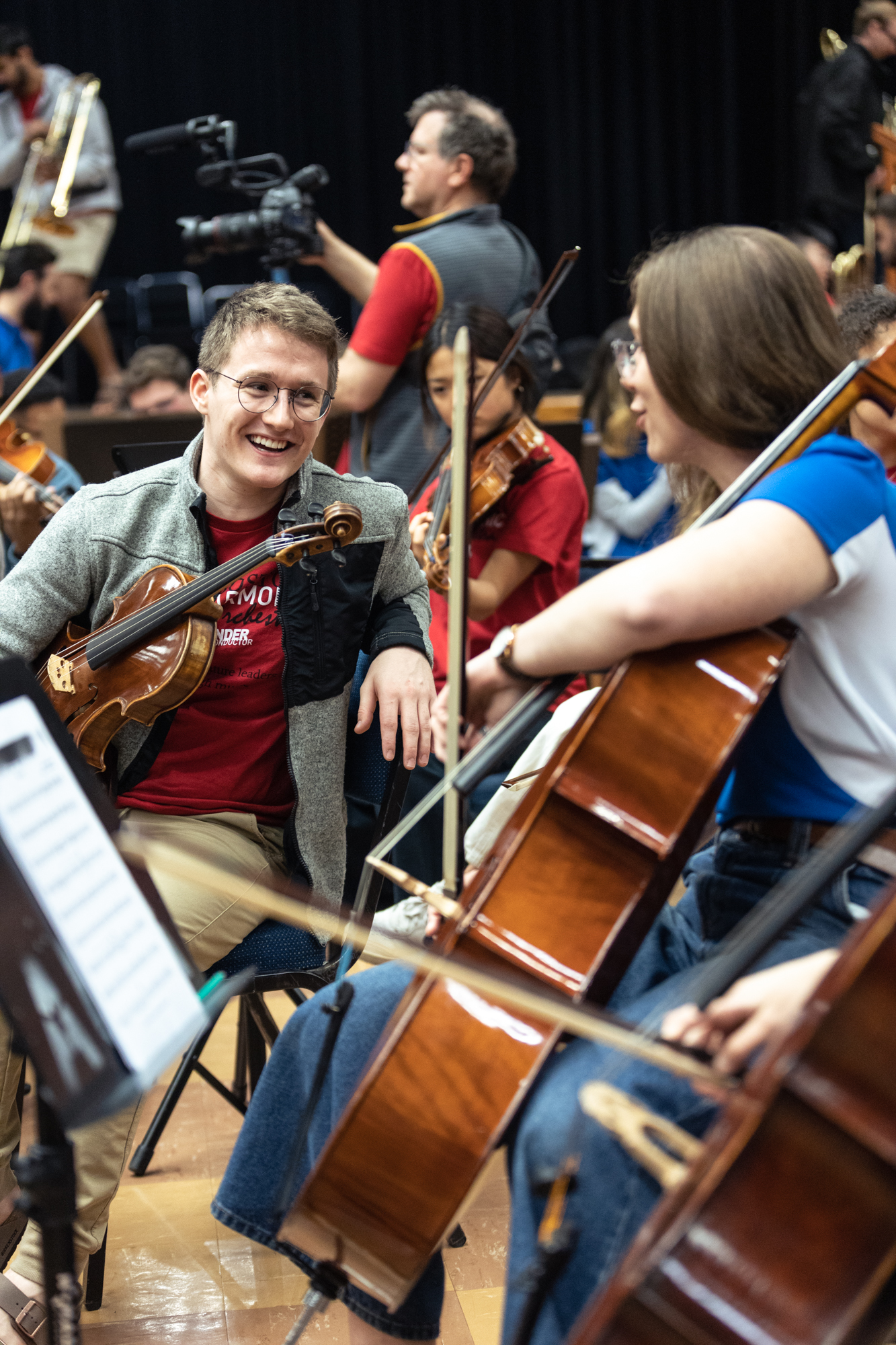
BPYO violist Chris Broyles with a new friend during the orchestra’s side-by-side at the University of Pretoria.
Where, then, does this leave us? What is one to make of the whole undertaking?
At the beginning of our journey, I wondered aloud (as it were) whether the effort of bringing a youth orchestra from Boston to play music by long-dead European composers for an audience in South Africa was worth it or not. There were, after all, lots of logistical and cultural obstacles to overcome and the demands this music makes are real for players and audiences alike.
Certainly, I figured, we’d find listeners who were familiar with what we were bringing, but for many the experience would be new. Could the BPYO and their music speak to people so far removed from them by distance, culture, and/or life experience?
In the end, I needn’t have worried. The receptions the tour programs received from audiences everywhere we visited were rapturous: the “shining eyes” that Ben’s always talking about and looking for were everywhere.
How was this possible? Well, I think a big part of it owed to the fact that, while the music the BPYO was playing is couched in the syntax and style of specific times and a particular geographic region, its themes – of struggle, perseverance, endurance, hard-won triumph, and the like – are truly universal; it’s the stuff of human experience.
To illuminate that aspect of the music is a matter of presentation and sometimes it requires extra-musical assistance. It happens that, as Boston concertgoers know very well, doing this very thing through pre-concert talks is one of Ben’s great gifts. He put the skill to terrific use before every concert in South Africa.
Accordingly, a kind of “shock of recognition” was consistently present in and after all of the orchestra’s performances. It turns out that not only is there an audience for Beethoven, Mahler, and Strauss in South Africa – one that cuts across economic, cultural, racial, and financial barriers – but there appears to be, as I noted in an earlier entry, a real desire to hear this music specifically for the messages of hope, regeneration, and possibility they contain.
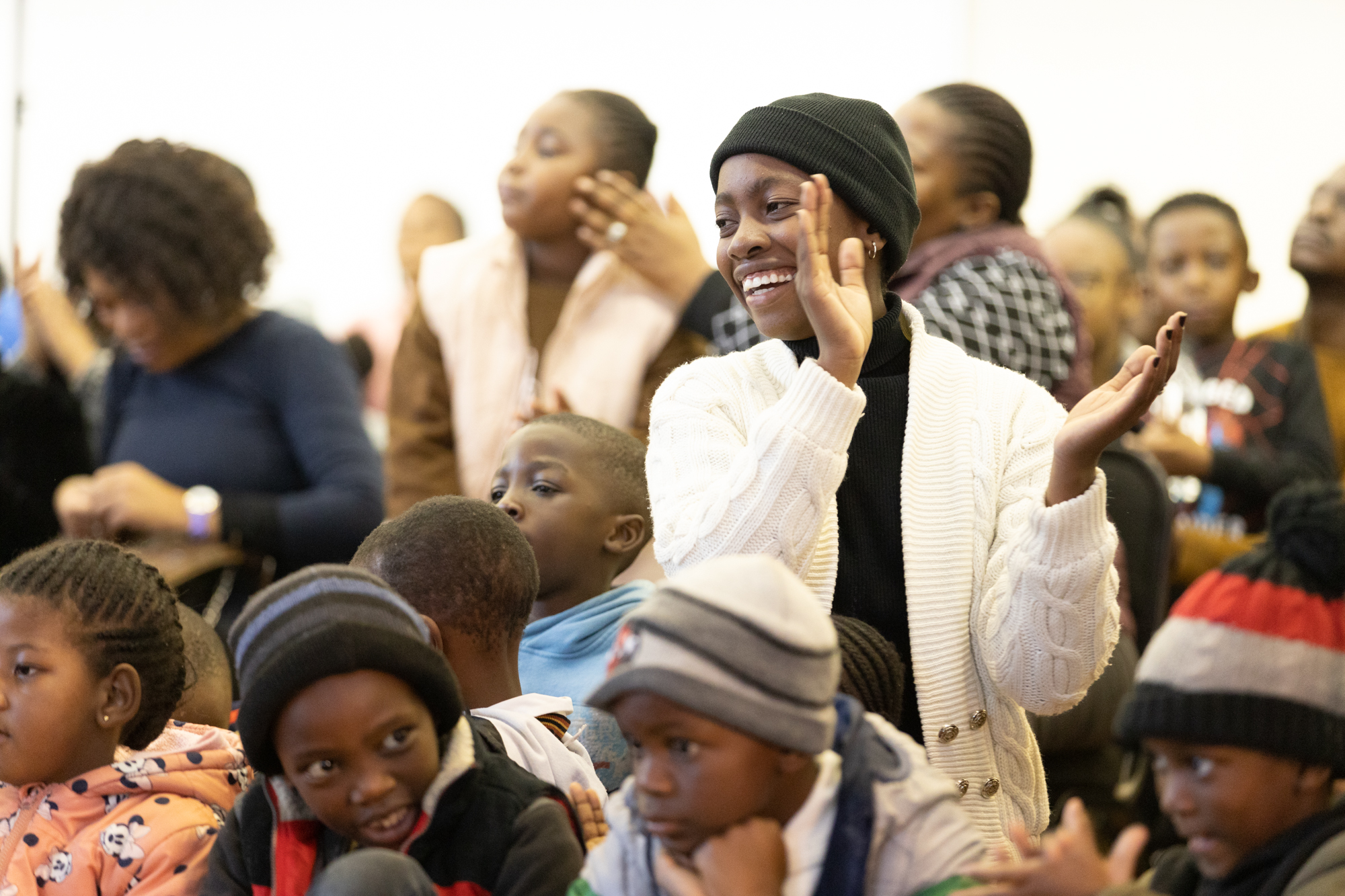
Some of the enthusiastic audience during the BPYO’s exchange at the Morris Isaacson Center for Music in Soweto.
That the last point emerged so potently was especially heartening, since it’s the guiding principle of much of Ben’s work and the primary mission of the BPYO. That it wasn’t lost in translation was emphasized by a series of articles that appeared in the local press over the course of our time in the country. The most comprehensive, a lengthy piece in the Daily Maverick, is a remarkable document worth reading in full.
So, on a macro level, this trip was emphatically meaningful and successful.
It was also powerful in more individual, personal ways.
There was, for instance, the cellist at the exchange in Cape Town who came away telling Ben that “this experience has changed my relationship with classical music for the rest of my life.” There were the kids with tears of delight in their eyes after hearing the sound of an orchestra for the first time at the Morris Isaacson Center for Music. There were the audience members who launched into raucous howls of approval after our Mahler concert in Regina Mundi – and then proceeded to sing and dance themselves down the main aisle and out of the church into the night.
In fact, there are countless stories to tell and memories to recount, some of them big (like the Resurrection Symphony in the dark in Soweto), some of them as yet unspoken. Surely, many will appear in the White Sheets orchestra members write and submit to Ben at the end of these tours.
Suffice it to say, the last eighteen days made a profound impression on all who participated from the BPYO’s side. But it proved equally significant for many of the South Africans we met. Don’t take my word for it: take Palesa Nameng’s.
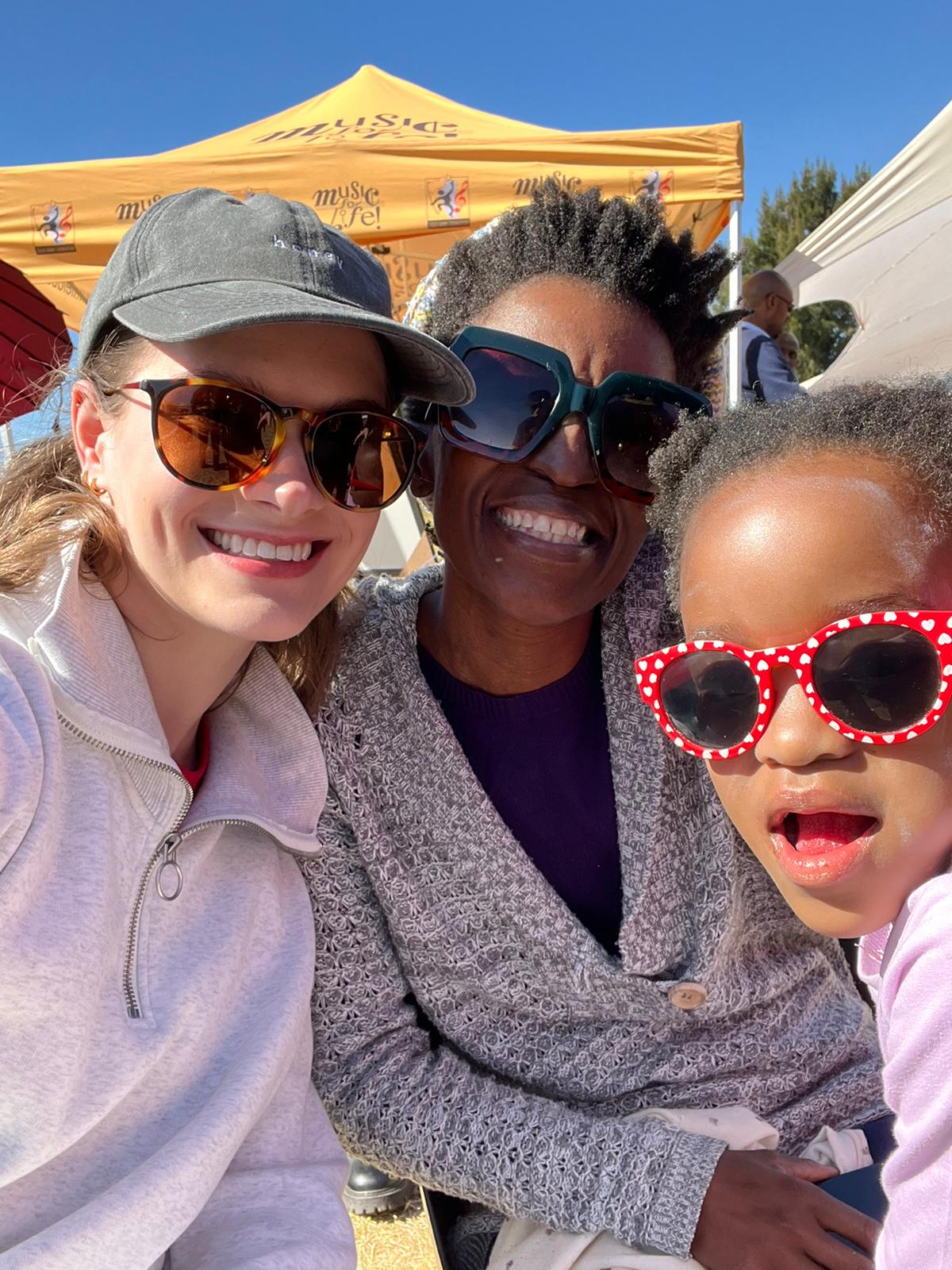
Palesa Nameng and daughter Imani with BPYO chaperone Lise Leishman.
A former violinist, Palesa and her adorable 5-year-old daughter Imani befriended several BPYO members and staff during the Field Band Foundation exchange in Soweto. Having studied music and then given it up, she had a singular perspective on the event. But her reaction to it is representative of what we subsequently heard from many locals with whom we conversed.
A day or so after the event, she sent a note to chaperone Lise Leishman. I’m hard-pressed to think of any statement that might better justify the saga just completed, provide a more powerful affirmation of Ben’s lifelong belief in the power of music to transform lives, or testify to the BPYO’s musical achievements than this.
“Let me tell you,” Palesa wrote, “[your] orchestra definitely took me back to my orchestra days. I found it not only deeply inspiring but also very healing. In essence, for me it was a reminder that A Creative Space is A Safe Space.
“So don’t ever take for granted what you guys are doing. You must tell the kids as well [that I say] they are doing such a great job and that all their hard work and dedication changes the world. Tell them that they are healing and comforting people and that they bring joy and happiness and inspiration into people’s lives everywhere they go.”
Click here to view the BPYO South Africa Tour Collection.
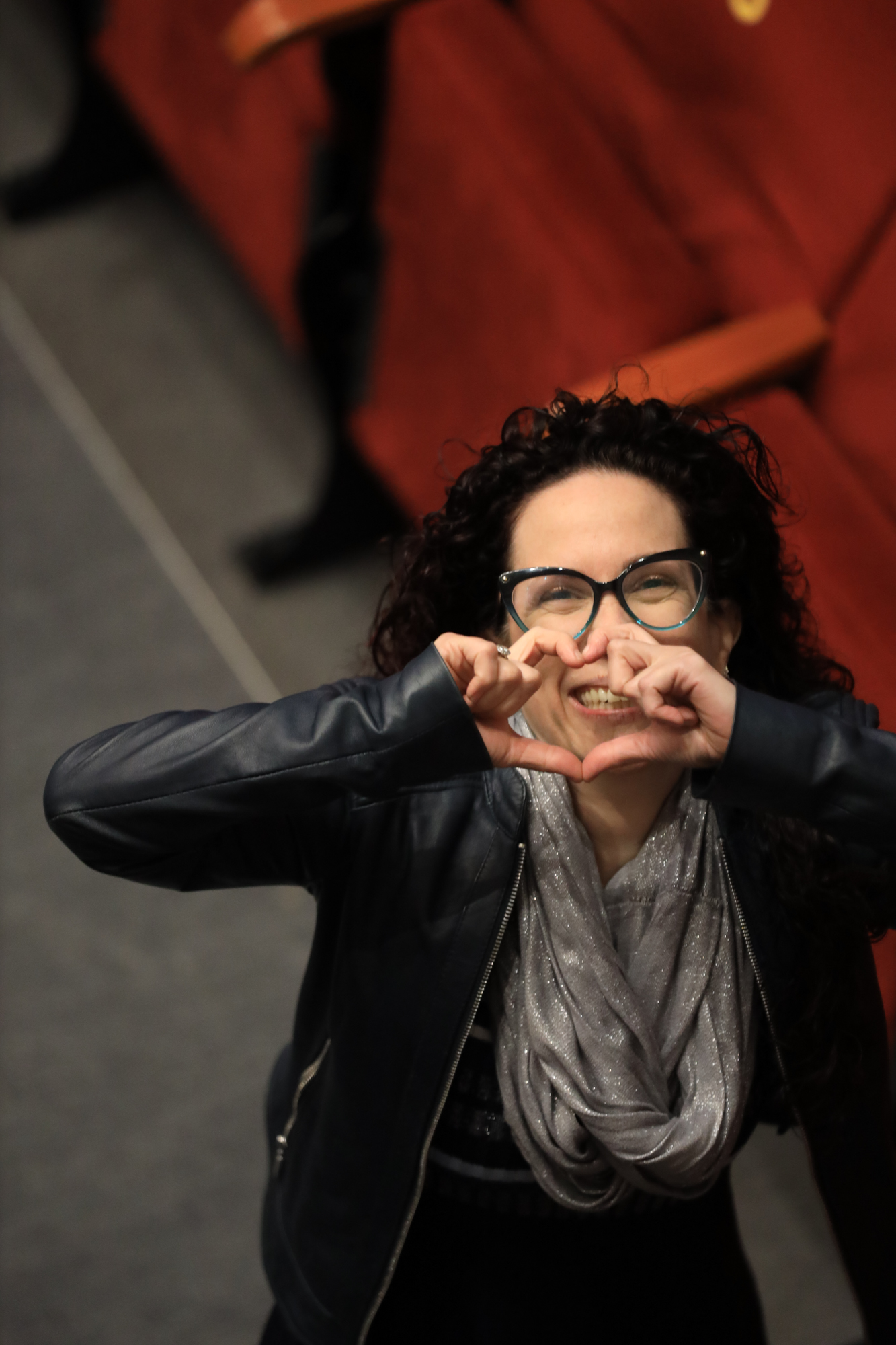
 Jonathan Blumhofer - The Arts Fuse
Jonathan Blumhofer - The Arts Fuse